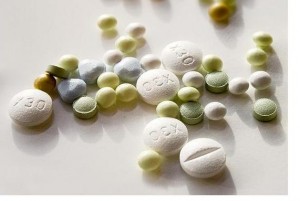MONDAY, 7 MARCH 2011
 When a molecule is not equivalent to its mirror image it is known as chiral and the two structures are enantiomers of each other. Enantiomeric pairs are common in biological systems and can interact with other chiral molecules very differently, sometimes leading to problems in drug design; in many cases one form of the drug provides the beneficial treatment whilst its mirror image can either be inactive or cause severe side effects. The difficulty for the pharmaceutical industry is preferentially manufacturing one enantiomer over the other. Ideally a chiral catalyst would be used to guide formation of a product with specific chiral arrangements.
When a molecule is not equivalent to its mirror image it is known as chiral and the two structures are enantiomers of each other. Enantiomeric pairs are common in biological systems and can interact with other chiral molecules very differently, sometimes leading to problems in drug design; in many cases one form of the drug provides the beneficial treatment whilst its mirror image can either be inactive or cause severe side effects. The difficulty for the pharmaceutical industry is preferentially manufacturing one enantiomer over the other. Ideally a chiral catalyst would be used to guide formation of a product with specific chiral arrangements.Industrial metal catalysts are commonly used in the formation of chiral molecules, but have limited chiral selectivity and can be expensive to produce. Researchers have developed a method in which enantiomerically pure chiral products are produced through the use of a chiral organic catalyst [1] . A large chiral acid catalyses the formation of a five-membered ring from a diene by sterically hindering the formation of the other enantiomer.
The team have also shown that this method can be applied in production of many ‘privileged structures;’ which are parts of molecules known to produce highly effective drugs. However, they indicate that some reactions cannot be achieved with this process.
Written by Jonathan Lawson
